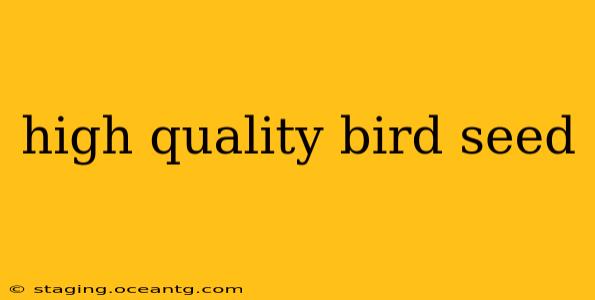Attracting birds to your backyard is a rewarding experience, offering hours of entertainment and a connection with nature. However, providing them with the right food is crucial for their health and well-being. This guide delves into the world of high-quality bird seed, exploring what makes it superior and how to choose the best options for your feathered friends.
What Makes Bird Seed "High-Quality"?
The quality of bird seed hinges on several factors:
-
Seed Source and Purity: High-quality seed comes from reputable suppliers who prioritize clean, weed-free sources. Impurities like mold, pesticides, or other unwanted materials can be detrimental to bird health. Look for seed blends with minimal filler and a high percentage of preferred birdseed types.
-
Seed Variety: A diverse blend caters to different bird species' dietary needs. Sunflowers, niger (thistle), white proso millet, cracked corn, and peanuts offer a good variety. Consider your local bird species when selecting a blend.
-
Freshness: Stale seed loses its nutritional value and can become rancid, potentially causing illness. Buy seed in smaller quantities more frequently to ensure freshness, or store it in a cool, dry place in airtight containers.
-
No Additives or Preservatives: Avoid seed blends containing artificial colors, flavors, or preservatives. These additives offer no nutritional benefit and can be harmful to birds.
What Types of Bird Seed Are Considered High-Quality?
Several seed types are widely recognized for their high nutritional value:
-
Black Oil Sunflower Seeds: A favorite among many bird species, these seeds are high in fat and provide excellent energy. Their thin shells make them easy for smaller birds to crack.
-
Nyjer (Thistle) Seeds: Tiny seeds incredibly popular with finches and goldfinches. They're high in oil and offer a rich energy source. Often sold in specialized feeders.
-
White Proso Millet: A small, inexpensive seed appealing to ground-feeding birds such as sparrows and doves.
-
Safflower Seeds: Another excellent source of energy, safflower seeds are attractive to many species but less favored by squirrels, making them a good option if you have a squirrel problem.
What Are the Benefits of Using High-Quality Bird Seed?
Feeding birds high-quality seed offers several key advantages:
-
Improved Bird Health: Nutritious food translates to healthier birds, stronger immune systems, and increased resistance to diseases.
-
Attracting a Wider Variety of Birds: A diverse, high-quality blend will attract more species to your feeders.
-
Reduced Waste: Higher-quality seeds often have fewer fillers and unwanted materials, minimizing waste and keeping your feeders cleaner.
-
Increased Bird Activity: Happy, healthy birds will be more active and engaging to watch.
How Can I Tell If My Bird Seed Is of Poor Quality?
Signs of poor-quality bird seed include:
-
Presence of Weeds or Debris: An excessive amount of undesirable material indicates a lack of care in seed processing.
-
Mold or Mildew: A musty odor or visible mold indicates spoilage and should be avoided.
-
Dustiness: Excessive dust can be an indicator of poor handling and storage.
-
Rancid Smell: A sour or rancid smell is a clear sign that the seed is no longer suitable for consumption.
Where Can I Buy High-Quality Bird Seed?
High-quality bird seed can typically be found at:
-
Local Bird Supply Stores: These stores often offer a wide selection of high-quality blends and individual seed types. They can provide expert advice tailored to your region and bird species.
-
Online Retailers: Many reputable online retailers specialize in bird seed and feeders, offering convenient purchasing options.
What Kind of Bird Seed Should I Avoid?
Avoid bird seed mixes containing:
- Large amounts of filler seeds: These provide little nutritional value.
- Millet-heavy mixes: While millet is good for some birds, too much can be less nutritious than other options.
- Seeds coated in artificial colors or flavors.
By understanding the characteristics of high-quality bird seed and selecting appropriate blends, you can contribute significantly to the health and well-being of the birds you attract to your backyard. Remember to monitor your feeders regularly and provide fresh, clean seed consistently. This simple act provides an enriching experience for both you and your feathered friends.
